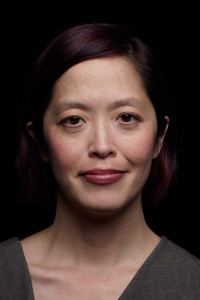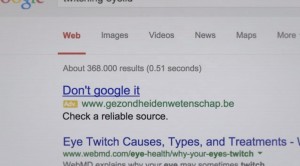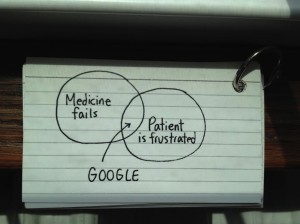 I have to thank my colleague @SusannahFox for alerting me to this Washington Post article—about a campaign by the government in Belgium to get people to stop Googling their symptoms.
I have to thank my colleague @SusannahFox for alerting me to this Washington Post article—about a campaign by the government in Belgium to get people to stop Googling their symptoms.
Check out the video that was made (below). In it the narrator states: “I have a deadly disease and I am going to die in six weeks. Or at least, that’s what I thought when I used Google to diagnose my twitching eyelid. I’m not the only one. Instead of consulting a doctor, 75% of the population uses Google to diagnose their symptoms, and on the internet, anyone can be a doctor. Most cures you’ll find online only make things worse. The Flemish government commissioned us to prevent people from making this mistake.”
http://vimeo.com/110476768
The company commissioned to run this campaign, DDB Brussels, conducted a Google Adwords campaign of the top 100 most searched symptoms. Now when a user from Belgium searches for those symptoms, this pops up:
The narrator continues: “The sponsored link leads you to a government website, where reliable and professional information can be found. On the page we included an awareness video showing what could possibly happen when you consult doctor Google.”
And he ends with the advice: “So remember kids, don’t Google it!”
This ad campaign was directed at Belgians, not Americans, but the issues raised are universal, which leads us to these three realities about Dr Google:
Reality number one: Google is the first place doctors go to for medical information
Talk to any doctor you know, and who do they first consult? Google. OK, so doctors usually have some form of expertise, but for any rarer cases of disease, if you have lingering questions about symptoms or medication doses, then honestly Google is the easiest place to go. And don’t forget that this article from the Atlantic revealed this ugly truth:
“Wikipedia is the top source of healthcare information for both doctors and patients. Fifty per cent of physicians use Wikipedia for information, especially for specific conditions.”
So let’s just be realistic, even if you decide to go to a doctor first, you are still consulting Dr Google by default. I am not advocating that patients bypass the medical system altogether, but we have to recognize that all knowledge, even medical knowledge, is becoming more networked, collective, and real time. This article in the Atlantic describes it to a T:
“We are in a new age of ‘networked knowledge,’ meaning that knowledge— ideas, information, wisdom even— has broken out of its physical confines (the pages of a book or the mind of a person) and now exists in a hyperconnected online state.”
The bottom line is that you often won’t find the answer in that dusty medical textbook published four years ago, and the network may actually protect us from the mistakes of any lone doctor.
Reality number two: The poor design of the healthcare system leads the user to Google
This drawing by @JessicaHagy really captures it in a powerful and succinct way. People need more in depth health information, and the two page black and white paper handouts we provide aren’t sufficient.
Reality number three: Google is the gateway to communities of expert patients on social media sites
One third of US adults have gone online to try and figure out a medical condition they may be dealing with (for a diagnosis), and 59% of US adults say they went online in the last year to gather health information. And they are finding that information on social media. (Gasp!) Yes, social media! That dirty word in the medical establishment. Healthcare professionals groan about all the “bad” medical information online and wasted time in the clinical encounter with patients who have too many “internet” questions.
But it’s the place where patients are making diagnoses, creating health education materials, and finding the peer support that is critical for their wellbeing. Let’s be honest, who is more expert at a disease than the person who’s living with it? Have you heard about the Nightscout Project, a DIY open source project? It’s the most disruptive and transformative technology to hit the diabetes community in the last decade, and it couldn’t have happened without social media.
Healthcare, wake up. It’s not the 1990s anymore. Social media, Google, and the internet are medical therapy. My recommendation: do Google it.
This blog was originally published on Joyce Lee’s own blog site.
Joyce Lee is associate professor of pediatrics at the University of Michigan, where she is a clinical diabetes specialist, and conducts clinical/health services research. As “Doctor as Designer,” she blogs and tweets about the intersection of health, emerging technologies, and patient centered participatory design. She recently developed a new social media guide for physicians and researchers, which aims to provide more information about the incredible potential of social media for healthcare and medicine. She is the social media/web editor for JAMA Pediatrics, but her views don’t reflect those of the journal. She encourages you to follow her on Twitter.
I have read and understood BMJ policy on declaration of interests and declare the following interests: I receive compensation for my work as social media/web editor for JAMA Pediatrics, but my views do not represent those of the journal.


